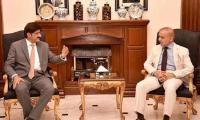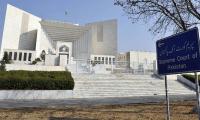Karachi pays the highest amount of tax to the federal government but in spite of that its businessmen are being termed ‘thieves’. The small traders of Karachi are giving Rs36 billion in taxes to the Centre against the small traders of Lahore, the second largest city of the country, who pay Rs700 million in taxes.
This was stated by Sindh Chief Minister Syed Murad Ali Shah on Saturday as he spoke at the Arts Council of Pakistan during the launch ceremony of a project to provide a platform for social integration of artists, intellectuals, youth and women by focusing on ‘fast, low-cost and high impact’ interventions.
The event was attended by Home Secretary and Project Director Karachi Neighbourhood Improvement Project (KNIP) Qazi Kabir, Arts Council President Ahmed Shah, senior officers of the Sindh government, representative of the World Bank, artists, Karachi-based leading businessmen of the country and media personnel.
Addressing the businesspersons in the gathering, the CM said in a light mood that he was happy that after politicians they were also being branded as thieves. “This gives me immense pleasure that you have been brought to our ranks and the day is not far away when every citizen of this country would be branded as a thief,” he remarked.
Continuing his satire, the CM said the business community of Karachi was not paying taxes. “Had you [businessmen] paid the taxes, the provincial government would have been given more funds by the federal government to develop this city.”
Murad said he was thankful to the World Bank for its assistance to his government in launching development works in the province. “At present around $2.5 billion development works are in progress in the city,” he added.
He said the federal government in its budget books had reflected an allocation of Rs1.8 billion for provision of fire tenders to the Karachi Metropolitan Corporation. The federal government has shown an ample utilisation against the allocation but the mayor says that nothing has been provided to him, the CM said.
He remarked that whenever he criticised the prime minister, he was issued a notice from NAB and the media started to ask him when he would be arrested. “Neither are you doing work nor do you let others work,” he said.
The CM said the PM was not ready to talk to him but was engaging the Sindh chief secretary in his meetings. “This shows that he [PM] wants to run the country through bureaucratic approach by ignoring the political realities of the provinces.” The CM said the Sindh government with the financial and technical support of the World Bank (WB) started the four-year KNIP in July 2017. He added that the purpose of the project was to enhance public spaces, urban road infrastructure, mobility, inclusion, and access to the market in targeted neighbourhoods such as Saddar, Malir and Korangi.
KNIP components
The CM said there were three major components of the project, including public space and mobility improvements in selected neighbourhoods, support to improved administrative services and city capacity development, and support for implementation and technical Assistance.
The CM said the Educational and Cultural Zone in Saddar was being renovated. Under the project’s phase-I, Din Muhammad Wafai Road/Strachan Road, Dr Ziauddin Ahmed Road and MR Kayani Road, which form a triangular boundary, have been selected as the sub-project area.
He said the total length of sub-project roads was estimated to be 2.5 kilometres. “A parking Plaza is also being built to tackle the challenges of parking in one of the most crowded areas of the city located at the National Museum.”
Murad said the World Bank on the request of the Sindh government had carried out a Karachi City Diagnostic (KCD) study to support the provincial government in implementing the Karachi Transformation Strategy through short-term and long-term engagements. “The Karachi City Diagnostic provides an overview of the challenges and opportunities facing the Karachi metropolitan region and estimates investment levels needed to bridge the infrastructure gap and improve the metropolitan region’s economic potential.”
“The facility of Arts Council of Pakistan is revitalised in a way that external areas of the council have been improved and urban space enhanced with soft and hard landscape to facilitate much more audience than it used to cater before, in order to support art and cultural communities,” the CM said.
He added that under the KNIP, various stakeholder workshops and meetings were held before and during the project’s execution. He informed the event that at the Arts Council, around 162,000 project beneficiaries had been counted, of which the ratio of men was approximately 60 per cent (about 97,200) and women was 40 per cent (about 64,800) as casual visitors, artists and participants.
He said another component of the KNIP had become a success story, which was the single window facility at the Sindh Building Control Authority to facilitate the automation of construction permits under one roof. “The time required for construction permits has reduced from 45 days to 15 days. The Ease of Doing Business Index ranking of the country has improved,” he said.
The image shows a tobacco company worker holding cigarettes. — AFP/FileHYDERABAD: An illegal cigarette factory...
This image shows the dead body. — AFP/FileAn incident unfolded in Quaidabad on Tuesday, resulting in one fatality...
Edhi Marine Services team is busy in a rescue operation in Karachi on March 17, 2024. — PPI An e-taxi driver...
Shah Abdul Latif University Khairpur building can be seen in this image. — Facebook/Shah Abdul Latif University,...
Representational image of a handcuffed man. — Pexels/FileHYDERABAD: A police operation was carried out in Hyderabad,...
A representational image showing a person handcuffed and standing behind bars. — AFP/FileThe SSGC has continued...







